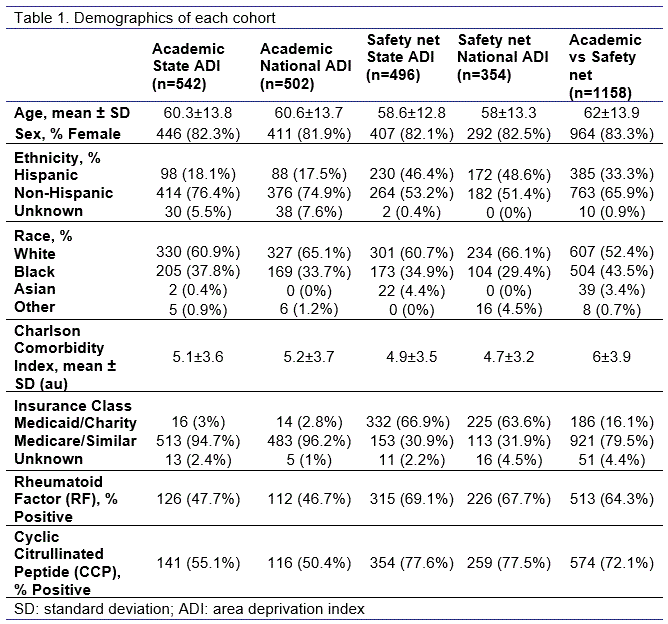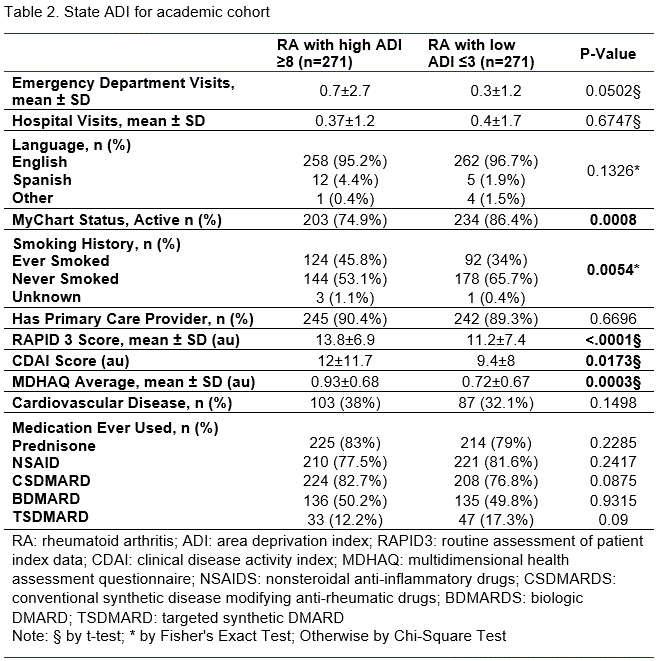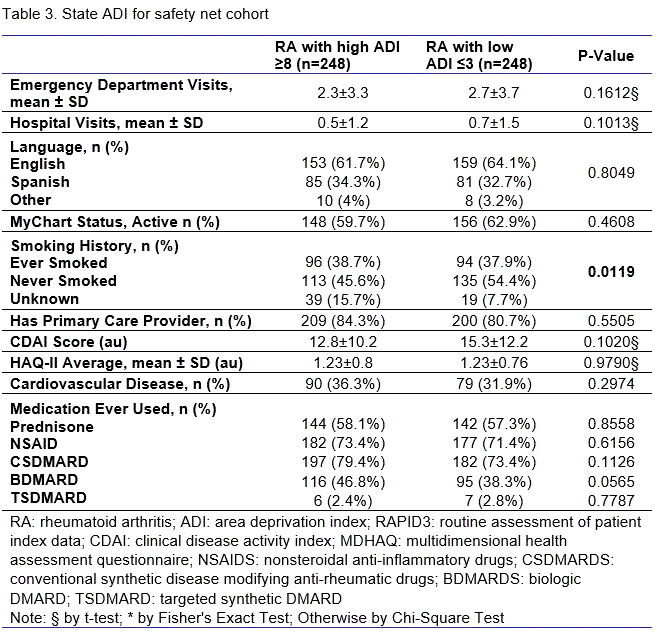Session Information
Date: Monday, November 13, 2023
Title: (1013–1032) Healthcare Disparities in Rheumatology Poster II: Socioeconomic Determinants
Session Type: Poster Session B
Session Time: 9:00AM-11:00AM
Background/Purpose: Rheumatoid arthritis (RA) is associated with increased morbidity and mortality, particularly if RA is poorly controlled. The effects of socioeconomic deprivation have not been well studied in the context of RA. We analyzed the impact of the Area Deprivation Index (ADI) on disease activity and cardiovascular comorbidity in RA.
Methods: We conducted a retrospective analysis of RA patients, defined by ICD-10 codes, seen at our academic practice and safety-net hospital system clinics in the past 5 years and are 18-89 years old. We collected age, ethnicity, race, gender, insurance plan, primary language, address, RA medications, MyChart engagement, primary care physician presence, emergency department/inpatient visits, RA disease activity and functional scores (CDAI, MDHAQ/HAQII, RAPID3), Charlson comorbidity index (CCI), and cardiovascular disease (CVD) presence. ADI was used as a proxy for socioeconomic deprivation and was assigned using 9-digit zip codes. Patients were divided by the upper ADI tertile vs lower ADI tertile and matched by gender, race/ethnicity, age, insurance and CCI using propensity score analysis. Two-sample t test and Chi-square test were conducted for final group comparisons.
Results: Patients from our academic practice (n=542) and from our safety-net hospital system (n=496) were assessed using state ADI. The mean state ADI score was 5.3 and 5.6 for academic and safety-net, respectively (range 1-10). In the academic cohort, those with high ADI scores ( >8, more deprived) had higher RA disease activity (RAPID3: High 13.834±6.943 vs Low 11.166±7.370, p< 0.0001, CDAI: High 11.970±11.738 vs Low 9.400±7.968, p< 0.05) and RA functional impairment (MDHAQ: High 0.933±0.676 vs Low 0.722±0.667, p< 0.001) and had lower MyChart utilization (p< .001) compared to those with low ADI scores (< 3, less deprived). There were also statistically significant differences in smoking status (p< .01). In the safety-net cohort, there was a statistically significant difference in smoking status (p< 0.05). Otherwise, for the safety-net cohort, there were no significant differences between the high ADI and low ADI group in any of the other measured variables.
Conclusion: We found significant differences in RA disease activity and function in patients from more socioeconomically deprived areas in the academic system. The absence of these differences in safety-net patients raises important questions as to whether certain hospital specific factors influence the role ADI plays in various health outcomes. The results suggest that ADI may not be as effective at predicting RA disease activity at a safety-net hospital. Identifying the discrepancies between the two hospital systems may elucidate areas of improvement for patient care.
To cite this abstract in AMA style:
Kim J, Zhang S, Solow E. Geographic Socioeconomic Influences on Disease Activity in Rheumatoid Arthritis in an Academic and Safety-Net Hospital System [abstract]. Arthritis Rheumatol. 2023; 75 (suppl 9). https://acrabstracts.org/abstract/geographic-socioeconomic-influences-on-disease-activity-in-rheumatoid-arthritis-in-an-academic-and-safety-net-hospital-system/. Accessed .« Back to ACR Convergence 2023
ACR Meeting Abstracts - https://acrabstracts.org/abstract/geographic-socioeconomic-influences-on-disease-activity-in-rheumatoid-arthritis-in-an-academic-and-safety-net-hospital-system/



